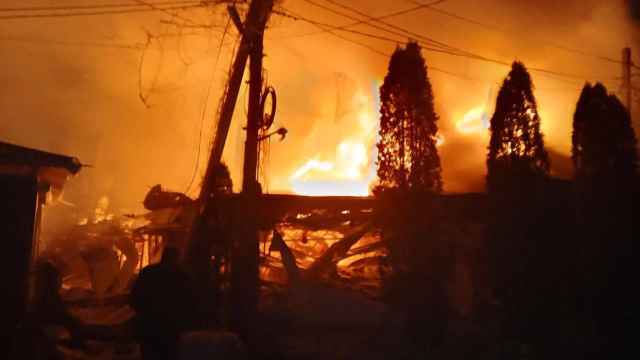VILNIUS/RIGA — The Baltic states, faced with a ban on food products ranging from beef to cottage cheese by Russia, say their dairy and transport sectors are most vulnerable but brushed off any major economic hit, saying they had long grown used to such embargoes.
Moscow surprised many western food exporters this week with a one-year ban on meat, fish, dairy, fruit and vegetables from the European Union, the United States, Canada, Australia and Norway, in a stronger-than-expected response to western sanctions over Ukraine.
Latvia, Lithuania and Estonia, the only parts of the former Soviet Union to successfully integrate with the West and join NATO and the European Union, have viewed neighboring Russia's actions in Ukraine and elsewhere with concern.
"I want to express regret that Russia has chosen to start economic war and ban food product imports instead of reducing escalation in Ukraine," Latvia Prime Minister Laimdota Straujuma said on television Friday.
All three Baltic states have called on NATO to establish permanent bases in the region and deter Russia from interfering. Lithuania has protested against what it sees as provocative and unannounced military maneuvers this year in Russia's Kaliningrad enclave, home to the country's Baltic fleet.
Baltic leaders said volatile trade with Russia was nothing new.
"Russia has become a totally untrustworthy and unpredictable business partner," Lithuania's president, Dalia Grybauskaite, said in a statement Friday.
Last year, Lithuania faced Russian bans on its dairy products and truckers as the country, which presided over the Council of the European Union at the time, lobbied for Ukraine to sign an association treaty in Vilnius.
Ukraine's president Viktor Yanukovych eventually refused, sparking protests which led to his downfall.
Baltic food exports to Russia represent a small fraction of overall exports but are key for the meat and dairy industries.
Dairy and meat made up about half of Lithuania's food exports to Russia. For Latvia, 40 percent of the food banned by Russia comprises dairy products such as cheese and butter.
Lithuania's government said Friday the economic impact would be limited but that should sanctions drag on, economic growth — seen at 3.4 percent this year — could slow by 0.2 percentage points.
Logistics companies in Lithuania might suffer in particular as about a tenth of the trade they carry to Russia is comprised of food products, both from Lithuania and from elsewhere.
Latvia's transport minister said logistics companies were at risk of incurring "several tens of millions of euros" in losses.
"Sectors of transport and logistics, which serve the transit flow, will have to reduce business with Russia and search for new markets," DNB wrote in a note.
Still, Lithuania's minister of agriculture told a news conference that the country was probably in better shape than the rest of the EU as it has dealt with countless Russian embargoes in the past.
"Now we know how to readjust. … Our companies knew such a situation could be repeated, so they all have contingency plans," Virginija Baltraitiene said, adding there were plans to amend laws to allow raw meat to be exported to Muslim countries.
A wider impact seems limited for now.
"There will not be much impact outside these sectors, unless consumer confidence takes a hit due to expectations of wider sanctions," said Swedbank's chief economist, Nerijus Maciulis.
In Estonia, the agriculture minister was quoted by local media as saying the dairy sector would be the hardest hit but that the bans were nothing the country had not handled before.
Latvia plans a special government session about targeted support for companies. It is considering temporarily lowering corporate and labour taxes, and introducing additional state guarantees on loans for affected firms.
See also:
A Message from The Moscow Times:
Dear readers,
We are facing unprecedented challenges. Russia's Prosecutor General's Office has designated The Moscow Times as an "undesirable" organization, criminalizing our work and putting our staff at risk of prosecution. This follows our earlier unjust labeling as a "foreign agent."
These actions are direct attempts to silence independent journalism in Russia. The authorities claim our work "discredits the decisions of the Russian leadership." We see things differently: we strive to provide accurate, unbiased reporting on Russia.
We, the journalists of The Moscow Times, refuse to be silenced. But to continue our work, we need your help.
Your support, no matter how small, makes a world of difference. If you can, please support us monthly starting from just $2. It's quick to set up, and every contribution makes a significant impact.
By supporting The Moscow Times, you're defending open, independent journalism in the face of repression. Thank you for standing with us.
Remind me later.





